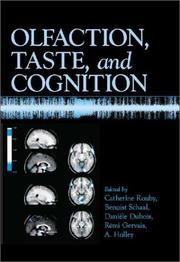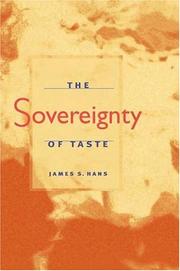| Listing 1 - 10 of 20 | << page >> |
Sort by
|

ISBN: 1107129559 1280160322 9786610160327 0511118953 113914667X 0511067151 051106084X 0511307454 0511546386 0511069286 9780511067150 9780511118951 9780511069284 9780511060847 9780521790581 0521790581 0521790581 Year: 2002 Publisher: Cambridge, U.K. New York Cambridge University Press
Abstract | Keywords | Export | Availability | Bookmark
 Loading...
Loading...Choose an application
- Reference Manager
- EndNote
- RefWorks (Direct export to RefWorks)
The human organs of perception are constantly bombarded with chemicals from the environment. Our bodies have in turn developed complex processing systems, which manifest themselves in our emotions, memory, and language. Yet the available data on the high order cognitive implications of taste and smell are scattered among journals in many fields, with no single source synthesizing the large body of knowledge, much of which has appeared in the last decade. This book presents the first multidisciplinary synthesis of the literature in olfactory and gustatory cognition. Leading experts have written chapters on many facets of taste and smell, including odor memory, cortical representations, psychophysics and functional imaging studies, genetic variation in taste, and the hedonistic dimensions of odors. The approach is integrative, combining perspectives from neuroscience, psychology, anthropology, philosophy, and linguistics, and is appropriate for students and researchers in all of these areas who seek an authoritative reference on olfaction, taste, and cognition.
Taste. --- Smell. --- Cognition. --- Psychology --- Olfaction --- Chemical senses --- Senses and sensation --- Nose --- Gustation --- Tasting (Physiology) --- Drinking behavior --- Tongue --- Food preferences
Book
ISBN: 9798890855558 1469669552 1469669560 9798890855541 9781469669564 Year: 2022 Publisher: Chapel Hill
Abstract | Keywords | Export | Availability | Bookmark
 Loading...
Loading...Choose an application
- Reference Manager
- EndNote
- RefWorks (Direct export to RefWorks)
"Wartime consumption of beer, wine, and spirits by civilians and soldiers in both North and South inflected debates over alcohol's effects on the individual body as well as the body politic. While drunkenness was a clear vice that threatened the war effort on both sides of the conflict, alcohol nevertheless was integral in military culture and medical departments for keeping soldiers healthy and fit for service. Bever shows how over time, the idea spread that sobriety was an essential trait of good, patriotic men, but this left Civil War veterans (many of whom continued to drink) outside the culture of acceptable masculine behavior at war's end"--
Drinking of alcoholic beverages --- Drinking behavior --- Masculinity --- Soldiers --- History --- Alcohol use --- United States. --- Military life --- United States --- Social aspects.
Book
ISBN: 9780231173483 9780231541428 0231541422 0231173482 Year: 2016 Publisher: New York : Columbia University Press,
Abstract | Keywords | Export | Availability | Bookmark
 Loading...
Loading...Choose an application
- Reference Manager
- EndNote
- RefWorks (Direct export to RefWorks)
Taste as Experience puts the pleasure of food at the center of human experience. It shows how the sense of taste informs our preferences for and relationship to nature, pushes us toward ethical practices of consumption, and impresses upon us the importance of aesthetics. Eating is often dismissed as a necessary aspect of survival, and our personal enjoyment of food is considered a quirk. Nicola Perullo sees food as the only portion of the world we take in on a daily basis, constituting our first and most significant encounter with the earth. Perullo has long observed people's food practices and has listened to their food experiences. He draws on years of research to explain the complex meanings behind our food choices and the thinking that accompanies our gustatory actions. He also considers our indifference toward food as a force influencing us as much as engagement. For Perullo, taste is value and wisdom. It cannot be reduced to mere chemical or cultural factors but embodies the quality and quantity of our earthly experience.
Gastronomy. --- Taste. --- Gustation --- Tasting (Physiology) --- Chemical senses --- Drinking behavior --- Senses and sensation --- Tongue --- Food preferences --- Eating --- Diet --- Cooking --- Dinners and dining --- Food --- Gastronomy --- Taste
Book
ISBN: 012813528X 0128135271 9780128135280 9780128135273 Year: 2019 Publisher: London, England : Academic Press,
Abstract | Keywords | Export | Availability | Bookmark
 Loading...
Loading...Choose an application
- Reference Manager
- EndNote
- RefWorks (Direct export to RefWorks)
"Aging, Nutrition and Taste: Nutrition, Food Science and Culinary Perspectives for Aging Tastefully provides research, facts, theories, practical advice and recipes with full color photographs to feed the rapidly growing aging population healthfully. This book takes an integrated approach, utilizing nutrition, food science and the culinary arts"--
Older people --- Nutrition. --- Taste. --- Aging. --- Age --- Ageing --- Senescence --- Developmental biology --- Gerontology --- Longevity --- Age factors in disease --- Gustation --- Tasting (Physiology) --- Chemical senses --- Drinking behavior --- Senses and sensation --- Tongue --- Food preferences --- Physiological effect
Book
ISBN: 0231159102 0231530315 9780231159104 9780231530316 178402550X 1281862827 9786613792143 Year: 2012 Publisher: New York : Columbia University Press,
Abstract | Keywords | Export | Availability | Bookmark
 Loading...
Loading...Choose an application
- Reference Manager
- EndNote
- RefWorks (Direct export to RefWorks)
Challenging the belief that the sense of smell diminished during human evolution, Shepherd argues that this sense, which constitutes the main component of flavor, is far more powerful and essential than previously believed. --from publisher description
Brain --- Nose --- Olfactory Perception --- Smell --- Taste Perception --- Taste --- Physiology. --- physiology. --- Physiological aspects. --- Taste. --- Chemical senses. --- Chemoreception --- Senses and sensation --- Chemoreceptors --- Gustation --- Tasting (Physiology) --- Chemical senses --- Drinking behavior --- Tongue --- Food preferences
Book
ISBN: 1281944394 9786611944391 0199716854 9780199716852 019532658X 0197729681 Year: 2009 Publisher: New York, NY Oxford University Press
Abstract | Keywords | Export | Availability | Bookmark
 Loading...
Loading...Choose an application
- Reference Manager
- EndNote
- RefWorks (Direct export to RefWorks)
Conditioned taste aversion is arguably the most important learning process that humans and animals possess because it prevents the repeated self-administration of toxic food. It has not only profoundly influenced the content and direction of learning theory, but also has important human nutritional and clinical significance. In addition to its direct relevance to food selection, dietary habits, and eating disorders, it is significant for certain clinical populations that develop it as a consequence of their treatment. The study of conditioned taste aversions has invigorated new theory and rese
Taste. --- Aversive stimuli. --- Stimuli, Aversive --- Aversion therapy --- Avoidance (Psychology) --- Conditioned response --- Punishment (Psychology) --- Gustation --- Tasting (Physiology) --- Chemical senses --- Drinking behavior --- Senses and sensation --- Tongue --- Food preferences --- Taste --- Behavior --- Conditioning (Psychology) --- Neuronal Plasticity --- physiology.

ISBN: 0252093283 9780252093289 0252027124 9780252027123 Year: 2002 Publisher: Urbana
Abstract | Keywords | Export | Availability | Bookmark
 Loading...
Loading...Choose an application
- Reference Manager
- EndNote
- RefWorks (Direct export to RefWorks)
Taste. --- Philosophical anthropology. --- Gustation --- Tasting (Physiology) --- Chemical senses --- Drinking behavior --- Senses and sensation --- Tongue --- Food preferences --- Anthropology, Philosophical --- Man (Philosophy) --- Civilization --- Life --- Ontology --- Humanism --- Persons --- Philosophy of mind --- Philosophy

ISBN: 0897664159 0897664167 9780897664165 9780897664158 Year: 1987 Publisher: New York, N.Y. New York Academy of Sciences
Abstract | Keywords | Export | Availability | Bookmark
 Loading...
Loading...Choose an application
- Reference Manager
- EndNote
- RefWorks (Direct export to RefWorks)
Physiology of nerves and sense organs --- Smell --- Taste --- Physiological aspects --- Congresses. --- congresses. --- SMELL --- TASTE --- Smell. --- Taste. --- Gustation --- Taste Sense --- Gustations --- Sense, Taste --- Senses, Taste --- Taste Senses --- Tastes --- Sense of Smell --- Olfaction --- Smell Sense --- Conferences - Meetings --- Odorants --- Olfactometry --- Tasting (Physiology) --- Chemical senses --- Drinking behavior --- Senses and sensation --- Tongue --- Food preferences --- Nose --- Physiological aspects&delete& --- Congresses

ISBN: 0309034493 9786610245734 1280245735 0309599105 0585085021 9780585085029 9780309034494 Year: 1985 Publisher: Washington, D.C. National Academy Press
Abstract | Keywords | Export | Availability | Bookmark
 Loading...
Loading...Choose an application
- Reference Manager
- EndNote
- RefWorks (Direct export to RefWorks)
Alcohol is a killer. One of every thirteen deaths in the United States is alcohol-related. This book takes a look at the problem, and is useful for those in the alcoholism prevention business. It is also aimed at counselors, politicians, judges, medical professionals, and law enforcement officials throughout the country.
POLITICAL SCIENCE --- Public Policy / Social Policy --- Alcoholism --- Drinking of alcoholic beverages --- Drinking Behavior --- Alcohol-Related Disorders --- Substance-Related Disorders --- Behavior --- Alcohol Drinking --- Mental Disorders --- Diseases --- Behavior and Behavior Mechanisms --- Psychiatry and Psychology --- Social Welfare & Social Work --- Social Sciences --- Substance Abuse --- Prevention --- Prevention. --- Alcohol consumption --- Alcohol drinking --- Alcohol use --- Alcoholic beverage consumption --- Consumption of alcoholic beverages --- Drinking problem --- Liquor problem --- Social drinking --- Alcoholic beverages --- Temperance
Book
ISBN: 1280497793 9786613593023 0803238134 9780803238138 9780803219359 0803219350 9781280497797 6613593028 Year: 2011 Publisher: Lincoln University of Nebraska Press
Abstract | Keywords | Export | Availability | Bookmark
 Loading...
Loading...Choose an application
- Reference Manager
- EndNote
- RefWorks (Direct export to RefWorks)
The old adage "you are what you eat" has never seemed more true than in this era, when ethics, politics, and the environment figure so prominently in what we ingest and in what we think about it. Then there are connoisseurs, whose approaches to food address "good taste" and frequently require a language that encompasses cultural and social dimensions as well. From the highs (and lows) of connoisseurship to the frustrations and rewards of a mother encouraging her child to eat, the essays in this volume explore the complex and infinitely varied ways in which food matters to all of us.
Beverages --- Food --- Gourmets. --- Taste --- Drinking customs. --- Food habits. --- Drinks --- Potable liquids --- Potables --- Liquids --- Bon vivants --- Epicures --- Gastronomes --- Gormands --- Gourmands --- Persons --- Gustation --- Tasting (Physiology) --- Chemical senses --- Drinking behavior --- Senses and sensation --- Tongue --- Food preferences --- Manners and customs --- Eating --- Food customs --- Foodways --- Human beings --- Habit --- Diet --- Nutrition --- Oral habits --- Social aspects. --- Food habits
| Listing 1 - 10 of 20 | << page >> |
Sort by
|

 Search
Search Feedback
Feedback About UniCat
About UniCat  Help
Help News
News